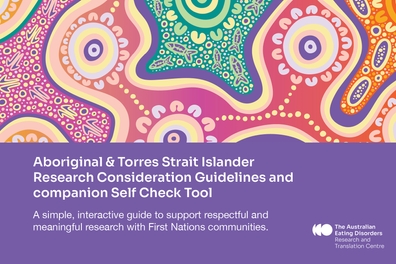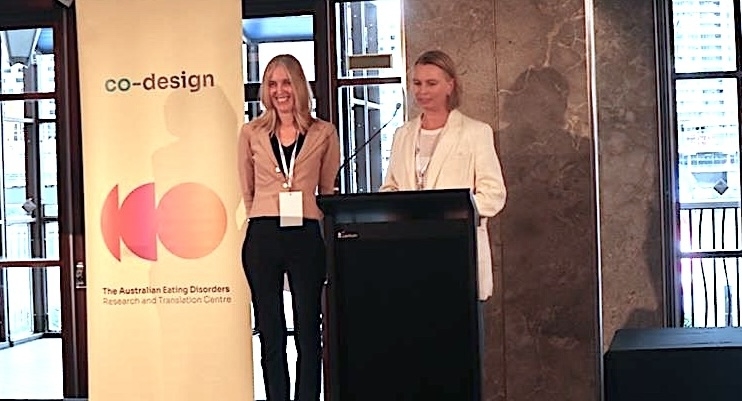
Watch the recording of the launch of the Aboriginal and Torres Strait Islander Researcher Self Check Tool and the announcement of a $2.8 million national First Nations-led research initiative.
24 June 2025
The importance of co production, collaboration and inclusion was central to the discussions, presentations and connections that made for a lively and inspired two days at Think Tank 2025 where eating disorders specialists came together to advance science and understanding.
Day one began with a Welcome to Country from Uncle Michael West who took all present on a fascinating journey on this history and traditional culture of the Eora Nation before Professor Sarah Maguire and Professor Liz Rieger gave a warm welcome to the event.
Shannon Calvert gave an inspiring Recognition of Lived Experience that reflected on how living and lived experience shape the way we talk about eating disorders and how taking the time to share pain will mean that; “Others may be better supported in the future.”
Minister Emma McBride opened the event, acknowledging Reconciliation Week and the collaborative approach involved in eating disorders research before Professor Genevieve Pepin launched the Centre’s new Quickstart Guide for co-production in eating disorders research.
The event’s first Keynote address was delivered by Professor Cheri Levinson who declared “This is just the beginning!” when presenting the groundbreaking results of her research into personalised treatment for eating disorders which suggest that personalised treatment significantly outperforms current gold-standard treatments such as cognitive behavioural therapy.
Professor Jennie Hudson challenged attendees to change the way they think about childhood mental health and Associate Professor Emily Stockings presented on the high burden of mental health on youth and how upskilling students to handle risky situations can empower them to make change and Professor Susan Rossell explored the prevalence of and new treatments for Body Dysmorphic Disorder.
After lunch, Bundjalung Elder, Associate Professor Uncle Boe Rambaldini presented a Workshop - “Nothing About us, Without Us” We don’t work for Aboriginal people, we work with Aboriginal people’. While recalling his personal journey, Uncle Boe recognised the need for truth-telling so that all Australians can move forward together toward a future that features equality and understanding.
“I want to build bridges so we can come together and live together in harmony, and we can do that by having a good understanding of each other. That's the only way we're going to go about changing our health,” he said.
“It's time for truth, telling, remembrance and reflection and let’s leave pride, blame and guilt outside it has no place when we come together!”
Quandamooka woman and First Nations Lead of the Centre, Leilani Darwin, launched the Centre’s Aboriginal and Torres Strait Islander Research Consideration Guidelines and companion Self Check tool which was designed to support respectful and meaningful research with First Nations Communities.
“What’s quite unique about what we’ve been privileged to be able to do at the Centre is to really, actually, consider for the first time ‘What does it mean for First Nations People to be included in the conversation around disordered eating and eating disorders?’ Because it just hasn’t been done,” she said.
The afternoon session focused on the biological determinants and the underpinnings of Binge Eating Disorder, with Dr Trevor Steward presenting on the use of MRI technology to map the brain mechanisms underlying disordered eating behaviours. Associate Professor Robyn Brown followed with an exploration of N-acetylcysteine as a pharmacotherapy for compulsive eating and Dr Morgan James led an insightful presentation and discussion around understanding sleep dysregulation in eating disorders.
Day two started with a breakfast session hosted by Professor Leah Brennan who led the discussion on supporting eating disorder organisations with research and evaluation before Luiza Bonfim Pacheco launched the Eating Disorder Tool Finder – a central hub for evidence-based screening tools, assessments, guidance and treatments for people with eating disorders.
The second Keynote Address of the event was delivered by Professor Luke Wolfenden who presented on Implementation science and the research to practice pipeline in the primary prevention of chronic disease and how expansion of a learning health systems approach has made an impressive improvement to implementation across multiple Local Health Districts in NSW.
Lighting round, which was chaired by Romany McGuffog, lived up to its name with three short sharp and inspiring pieces of research. Holly Harris spoke about Neurobehavioural correlates of ARFID symptoms in a population-based cohort of children and emphasised the importance of early intervention for children with ARFID and the need for more longitudinal studies to look at the optimal window for intervention. Daniela Ciciulla presented Prevalence and characteristics of avoidant/restrictive food intake disorder (ARFID) in children with and without food allergy: a population-based study which examined the risk of eating disorders in other chronic managed conditions, such as food allergies, and recommended clinicians look out for signs of ARFID in these populations. And Phoebe Ho asked the audience to imagine for a moment that they were a clinician with lived experience of an eating disorder before launching into her talk about her research into developing a better understanding of clinicians with lived experience.
Professor Nick Haslam presented - Spreading the word: How concepts of mental ill health have broadened, and why it matters - which examined concept creep in the diagnosis of mental illness and how the broadening of the meaning of harm concepts increasingly pervades psychology and broader culture.
Associate Professor Xochitl de la Piedad Garcia spoke about her work on weight stigma and eating disorders – examining the persuasive culturally shared stereotypes and attitudes to higher weight and how these are associated with disordered eating, and Dr Matt Varidel presented on Machine Learning and causal mental health models.
The second half of day two began with a workshop on Advancing Eating Disorder Research Through Lived Experience Partnerships Lived Experience-Led Panel Facilitated by Shannon Calvert. Panellists Amaya alvarez, Melissa Keller-Tuberg , Sam Ikin and Bronny Carroll discussed the importance of distinguishing between personal lived experience and lived experience expertise in research settings; the role of lived experience plays in improving the translation of research into meaningful change; and how participation in lived experience research can feel safe and non-tokenistic.
“Providing hope to all people is the most important thing you can do.” Bronny Carroll.
Think Tank 2025 came to a close with a very animated and closely contested Great Debate on the topic ‘Young People should be able to access social media under 16 years’ moderated by Dr Beth Shelton. Team Negative: Professor Nick Haslam, Jim Hungerford and Dr Hannah Jarman emerged victorious over Team Affirmative: Professor Cheri Levinson, Professor Susan Rossell and Sam Ikin.
We thank everyone who attended Think Tank 2025 for contributing to the discussion and for your dedication to working toward improving the lives of people with eating disorders.
Watch the recording of the launch of the Aboriginal and Torres Strait Islander Researcher Self Check Tool and the announcement of a $2.8 million national First Nations-led research initiative.
Aboriginal and Torres Strait Islander leaders, researchers, clinicians, and community members gathered on Gadigal Country last week to celebrate the launch of the AEDRTC Aboriginal and Torres Strait Islander Researcher Self Check Tool and a $2.8 million investment from the Australian Government to support the first national research into eating disorders in First Nations communities.
Recent developments in personalised treatment that take a flexible, holistic approach which considers a person’s biology, mental health and life circumstances, have the potential to revolutionise care for people with eating disorders and acknowledge the complex nature of these debilitating illnesses.
Watch the recording of the launch of the Aboriginal and Torres Strait Islander Researcher Self Check Tool and the announcement of a $2.8 million national First Nations-led research initiative.
Aboriginal and Torres Strait Islander leaders, researchers, clinicians, and community members gathered on Gadigal Country last week to celebrate the launch of the AEDRTC Aboriginal and Torres Strait Islander Researcher Self Check Tool and a $2.8 million investment from the Australian Government to support the first national research into eating disorders in First Nations communities.


